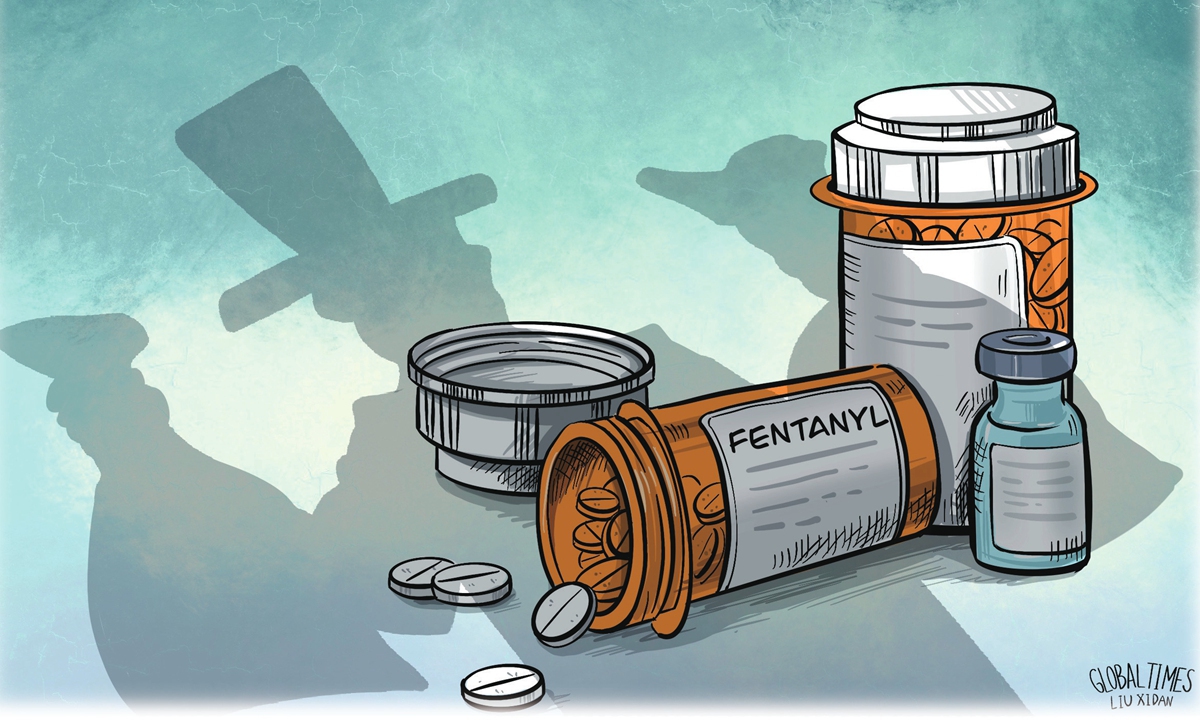
Illustration: Liu Xidan/GT
On Tuesday, China's State Council Information Office released a white paper titled "Controlling Fentanyl-Related Substances - China's Contribution." The white paper reflects China's people-centered anti-drug philosophy to ensure the health and well-being of the people, as well as its sense of responsibility by participating in global drug control, promoting global governance of drug-related issues, and safeguarding the health, safety and well-being of all of humanity.
First, China consistently upholds the principle of balancing "rational use" with "rigorous control," ensuring that fentanyl-based medications are confined strictly to medical and scientific research purposes. Fentanyl, sufentanil, remifentanil, and alfentanil possess advantages such as rapid onset, strong effect, and long duration, making them widely used in intraoperative anesthesia, postoperative analgesia, and for the relief of cancer pain. However, without proper control, they could potentially become harmful "poisons." To address this, China has established a comprehensive regulatory system: It ensures the public has ready access to effective medications; moreover, by establishing a digital tracking system, it implements whole-process dynamic monitoring and closed-loop management of fentanyl-related medications across all stages, effectively preventing their diversion into illegal channels.
Second, China innovatively implemented classification-based control of fentanyl-like substances, setting a global precedent. In 2019, the country issued a statement to implement full control of fentanyl-related substances, becoming the first country worldwide to do so. Through measures such as expanding the list of controlled substances, China maximized the prevention, crackdown and rectification of fentanyl-related substance abuse and illegal activities.
Third, China has established complete legal and administrative systems for scheduled precursor chemicals, forming a regulatory structure based on the Regulations on the Administration of Scheduled Precursor Chemicals and supported by a series of management measures and provisions. Through multi-departmental collaboration, China strictly controls the production and distribution of fentanyl precursors, while implementing various measures to prevent non-scheduled chemicals related to fentanyl from entering illegal channels abroad.
Fourth, China leverages technological innovation to provide robust technical support for the regulation of fentanyl-related substances. China has established a "1+5+N" narcotics laboratory network, led by the China National Narcotics Laboratory, with five regional branches as pillars, and numerous provincial- and city-level laboratories as key nodes.
Fifth, committed to the vision of a global community of shared future, China rigorously meets its international drug control obligations and pragmatically advances dialogue and cooperation with the US in narcotics control and law enforcement. China not only honors its own drug control responsibilities, but also firmly upholds the existing international drug control system, participates fully in making important decisions on international drug control, and contributes Chinese wisdom and solutions to the global governance of drugs.
Through concrete facts and scientific data, the white paper highlights the contributions of the Chinese government and people to global drug governance, effectively refuting the absurdity of the US in imposing an additional 10 percent tariff on Chinese exports under the pretext of the so-called fentanyl issue.
The severity of the fentanyl crisis in the US stems from domestic issues. Attempting to address internal problems through external measures is futile. Linking the domestic fentanyl crisis to tariffs is counterproductive and may hinder China-US cooperation in combating drug trafficking.
History shows that international collaboration is essential in addressing global drug challenges. The US should confront its issues directly, guided by specific problems, uphold international drug control conventions, and engage in effective cooperation and concrete actions.
The author is director of the International Center for Drug Control Policy Studies at Shanghai University. opinion@globaltimes.com.cn




